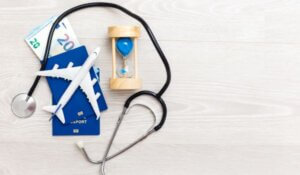
In 2016, I arrived in Vietnam after a long couple of flights and noticed a strange dull pain in one of my legs. Given that I had spent most of the flights asleep and entirely still, I took myself straight to the doctor, where I was diagnosed with a blood clot. I have learned a great deal about traveling with Eliquis since then.
What followed was three months of blood-thinning medication and compression stockings in a country not well known for its safety or quality of medical care. But, with some precautions and planning, those three months went by without incident, and the blood clot cleared. Being on blood thinners when moving around in a foreign place can be daunting, but staying safe on the go is possible with the right mindset and precautions.
What Are Blood Thinners?
Blood thinners or anticoagulants are medications taken orally or via injection to delay blood clotting. Examples of these medications include warfarin, rivaroxaban, and, of course, Eliquis (apixaban). However, sometimes we need our blood to clot quickly, like when we get injured, break a bone, or have a cut.
Medications are available to reverse the effects of anticoagulants in the case of an unexpected injury. However, this reversal process can be challenging and unpredictable, making it extra important to take care while traveling on this medication.
What You Need to Know When Traveling with Eliquis
Traveling while on Eliquis involves more than selecting a destination and packing your bags. To ensure a hassle-free journey, consider the following important aspects.
Pre-Travel and Travel Preparations: Ensuring a Safe Journey with Eliquis
Before you travel, find out where the closest hospital or doctor’s office is at your destination. This helps you be prepared in case of an emergency. Also, check what services your health insurance will cover.
If you’re traveling to another country, have the address and contact information for the U.S. embassies or consulates where you’ll be staying. They can help with medical care and give general advice.
Buy travel health insurance and medical evacuation insurance before your trip. This can help you if there’s an emergency while you’re overseas.
Finally, follow your healthcare provider’s advice regarding Eliquis and travel and keep up with doctor appointments and blood pressure checks, particularly if you are traveling for a long time.
Eliquis, Travel Insurance, and Medication Coverage
Before you travel, check your travel insurance to make sure it covers your condition. Look for a policy that includes coverage for medical emergencies and any issues related to your blood-thinning therapy. Also, confirming that your healthcare provider can supply you with enough Eliquis to last your entire trip might be a good idea.
Pro tip: IsraelPharm ships worldwide, so as long as you have a valid prescription, we can take care of the rest.
Packing Your Medication: Practical Tips for Traveling with Eliquis
While traveling, make sure you pack enough Eliquis for your whole trip, plus extra in case of delays. Keep the medication in its original packaging: This helps you identify the medication and shows essential details like the drug name, dosage, and expiration date.
Split your Eliquis into different containers, with some in your carry-on and the rest in your checked luggage. This way, you have a backup in case anything gets lost or stolen.
Get a letter from your healthcare provider explaining your condition, the need for anticoagulants, and specific dosages. This can help if you face issues at security checkpoints or need medical help during your travels.
Be aware of any transportation rules or restrictions that apply to Eliquis. They may vary from country to country.
Navigating Airport Security with Medication
In the US, you can bring medically necessary liquids, medications, and creams over the liquid-ounce limit in your carry-on bag. Take them out of your carry-on for separate screening. Store your medicines in a separate pouch within your carry-on for easy access during security checks.
Consider telling the security officers about your medical condition and that you have Eliquis with you. If needed, you can show the letter from your healthcare provider to security officers to further explain your situation.
Stay Hydrated
Dehydration can lead to slow blood flow and blood clots. Experts encourage drinking eight to ten glasses of water daily for good blood flow, especially if you can’t move around much, like when traveling for a long time.
While you can’t bring large water bottles through airport security, you can buy them after you pass through. Alternatively, if you are in a place with safe tap water, bring an empty bottle and fill it as needed. Avoid alcohol and caffeine: These can dehydrate you, so it’s best to steer clear of them.
Pack Compression Stockings
While compression stockings are easy to find and cheap enough where I come from, it was a nightmare trying to find a few reasonably priced pairs in Vietnam. If your doctor has recommended compression stockings as part of your treatment, you might want to stock up before you leave home.
Carry Important Health Information
The CDC recommends travelers carry a card listing their blood type, chronic illnesses, medications, immunizations, and allergies in both English and the local language of their destination. If you have a chronic condition and take medicine, bring a note from your doctor with your prescriptions, including generic names, in case you need refills. Always have your insurance card and know your insurer’s contact information for assistance.
Register Your Trip
If you’re from the US, consider registering your trip in the Smart Traveler Enrollment Program (STEP) to receive safety alerts and emergency help from US officials.
Research Destination Info
Find out where nearby hospitals, clinics, emergency services, and the local embassy are located. Research where to go if you get sick in less common destinations. Consider getting medical evacuation insurance for remote areas. Write down this information and keep it safe since phone or internet service might be limited.
Managing Medication Schedules Across Time Zones
Travel can mess up our daily routines, and crossing time zones makes it even trickier. Here are some tips to help you take your medications safely while traveling:
- If you take several pills, use a pill organizer that sorts by days of the week or times of the day. This helps you keep track of your doses and ensures you don’t miss any.
- Keep your watch set to your home time for medications that need to be taken at specific times. This helps you stick to your regular schedule.
- If you don’t wear a watch, set alarms on your phone. These reminders can help you stay on track with your medication.
- For longer trips, you may want to adjust your medication schedule for the local time zone. Be sure to plan this with your healthcare provider. They may recommend not taking more than the prescribed dose in 24 hours or having a bigger gap between doses rather than a smaller one.
- If you generally take Eliquis with food, make sure to keep a snack handy. Traveling shouldn’t change how you take your meds.
Staying Active: Safe Physical Activities While on Eliquis
While traveling with Eliquis, it’s important to keep in mind how important exercise can be for people on blood thinners – along with the knowledge that it can also have some risks. One big concern is excessive bleeding. Even though most bleeding incidents, like a shaving cut, aren’t very serious, they can take up to 20 minutes to stop. So, be careful during daily activities that might cause you to bleed.
- Avoid High-Risk Sports: Extreme sports like football, basketball, soccer, rugby, mountain biking, and skiing have a high risk of causing life-threatening bleeding.
- Choose Safer Activities: Safe exercise options include running, walking, and using a stationary bike. Even outdoor biking is okay if you wear protective gear to prevent skin injuries or bone fractures.
Dealing with Emergencies: What to Do if You Miss a Dose or Have Side Effects
When you’re on Eliquis and traveling, try not to miss a dose, because missing one can raise your risk of clotting. If you do miss a dose, take it as soon as you remember if it’s close to the time you missed it.
FAQ: What if I notice any symptoms or side effects from Eliquis while traveling?
If you notice severe bleeding, pink or brown urine, red or black stools, coughing up or vomiting blood, or something that looks like coffee grounds—seek help immediately. Also, watch out for stroke symptoms like dizziness, sudden vision loss, a severe headache, numbness or weakness in any limb, difficulty speaking, slurred speech, or drooping on one side of your face. Be alert for blood clot signs such as sudden severe shortness of breath, chest pain, swelling, redness, heat, or pain in any limb.
Choosing Safe Destinations: Considerations for Traveling on Eliquis
My doctor advised that the risk of blood clots while flying or traveling is not significantly higher if you take a few sensible precautions, like wearing compression stockings and walking around the plane every hour. He mentioned that I am likely at lower risk than someone my age who isn’t taking blood thinners, wearing stockings, or walking regularly during the flight. But there were some things he did tell me to watch out for:
Trying New Foods
When trying new foods while traveling, avoid making drastic changes to your intake of salads and vegetables. Green leafy vegetables are high in vitamin K and can affect blood clotting. If you usually eat a lot of these vegetables, keep doing so; if you don’t, don’t start suddenly.
Don’t Drink Too Much
To stay safe while taking Eliquis, avoid drinking alcohol unless your doctor says it’s okay to have a little bit.
Take Precautions if Engaging in Adventurous Activities
Plan your activities carefully. If you enjoy adventurous activities, use reputable organizers and wear full protective gear. Inform tour guides or event organizers that you’re taking anticoagulants, and double-check with your travel insurance provider that you are covered for the activity.
Finding Medical Help Abroad: How to Locate Doctors and Pharmacies
In some places, you can just show up at a hospital or clinic and get treatment, but that might not be the case everywhere. There may be some hoops you need to jump through first.
First, contact your travel insurance provider to find out if and where you’ll be covered. Knowing what financial assistance you’ll receive can help you make informed decisions.
Next, ensure you can communicate with your doctor or hospital. If you’re in a place where you don’t speak the local language, you may need a translator or English-speaking medical care. Check the US Embassy website under “US Citizens Services” for approved medical providers in the country you are in. You can also visit the International Association for Medical Assistance to Travelers (IAMAT) for links to databases with travel medicine specialists. The staff can probably help you find the right doctor or hospital if you’re staying at a hotel.
FAQ: Do blood thinners like Eloquis affect travel insurance?
Certain insurance companies may refuse coverage for travelers on blood-thinning medication because of the high chance of harmful side effects. While these medications help prevent or decrease blood clots, the downside is an increased risk of severe bleeding.
Returning Home: Post-Travel Health Checks and Medication Management
Monitor any changes in overall health and well-being and visit the doctor if anything unusual happens once you have returned home. Keep up with your scheduled appointments, blood tests, and monitoring, especially if you have only been prescribed the medication for a short time.
















